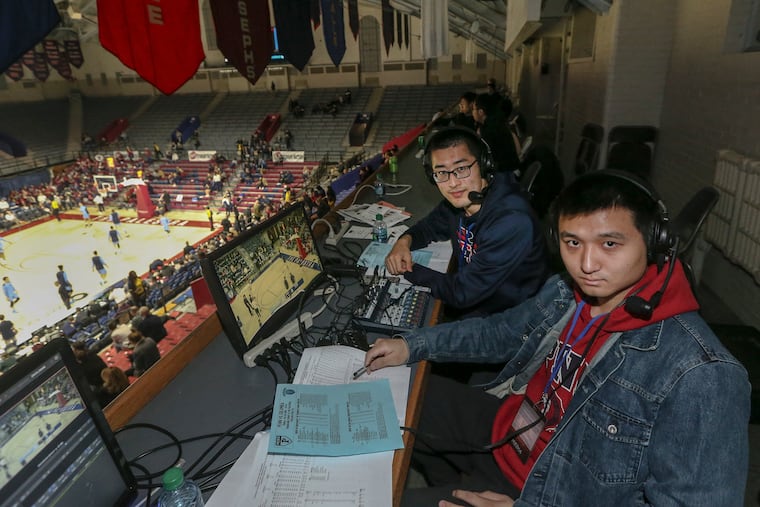Penn basketball games now spread far and wide, in Mandarin | Mike Jensen
The big reason: Michael Wang, a Chinese native, plays for the Quakers.

It began as a random out-loud thought in the Palestra stands early in Penn’s basketball season. Freshman Michael Wang was off to a good start. Wang is also a native of China.
“It was our first home game,’’ said Kevin Bonner, an associate athletic director at Penn. “Me and a couple of fund-raising folks. Michael comes in, was doing well. One of them said, ‘Wouldn’t it be cool if we broadcast these games in Mandarin?' "
Roll forward to the last Friday in February, the upper press box at the Palestra. Two native Chinese graduate students at Penn are speaking over an ESPN+ telecast of this Ivy League game, speaking in Mandarin.
“Michael is going inside … taking advantage of that mismatch,’’ Jintao Fu said at one point (as he translated later.) “The defender is trying to deny the ball. No chance.”
Fu went on to explain how Wang and Penn star big man A.J. Brodeur worked well on that play together, how Wang’s getting the ball to Brodeur provided better spacing.
“That was a good play with big men working together,’’ Fu said.
How many people heard this little exchange, in this country or in China? Fu has no idea. ESPN+ is a pay site in either country.
One definite customer: Wang’s parents back home in Taiyuan, the largest city in China’s Shanxi province. They’d been watching the English-language telecasts, but they don’t speak English.
“It helps them have a better experience watching the game,’’ Wang said. “I think for them, it just feels I’m closer to them in a way.’’
With the English telecasts, “it just felt like I’m still far away.”
Penn plans to keep doing this as long as Wang is playing, and maybe beyond. Penn’s football team is in China right now. Adding ties is only a good thing, Bonner said.
“Who knows where this could take us,’’ Bonner said.
China has been crazy for basketball for years. Close to twice as many people saw the Villanova-Penn game in China as in the United States, according to figures from the two countries provided by ESPN, which showed the game in the U.S. on ESPN2.
Obviously, this wouldn’t be happening if the 6-foot-10 Wang hadn’t made a quick impact this season.
But how hard was it to get a telecast going?
“Not as difficult as you would think,” Bonner said. “So we contacted the Ivy League, said, ‘Can we do this? Are we allowed to do this?’ They were very helpful with the ESPN+ side of it. We just had to buy the audio equipment, and our video people are just taking that feed and putting it on top of our audio. From a technical side, it wasn’t that difficult. The hardest part was getting the four kids who can speak Mandarin, and know basketball.”
That’s where Penn’s Chinese Students and Scholars Association came in. The association is a resource for the 38 percent of international students at Penn who come from China. Contact was made, and someone referred Bonner to Penn’s Chinese Basketball Association.
That’s right: Penn has a Chinese Basketball Association. There are regular games, including against other colleges. Wang already knew that — he’d shown up in the fall to meet people and ended up in a pickup game.
“We beat him!” Fu said.
Wang, who had played basketball at California prep powerhouse Mater Dei, found his reputation had preceded him among Chinese students, even on the road.
“Michael’s like a rock star,’’ Bonner said. “These Chinese students from George Mason wanted to get his autograph like he’s Michael Jordan. That was our opener.”
Fu was happy to become one of the voices of these telecasts. He had played basketball himself while at a university in Shanghai. He got his master’s at Penn and is in his first year of getting a doctorate in material science.
He doesn’t know how many people listen to the telecasts.
“I share the link on social media,’’ Fu said. “My friends were trying to watch, but you need to pay.”
Originally, Bonner said, if you tried to pick up the game in China, you got some kind of browser message that said something like, “No, sir, you can’t go to ESPN.”
Then, TenCent, one of China’s leading online providers, “told the Ivy League they were picking it up. OK, now this is going to be exciting,’’ Bonner said. “They have a relationship with ESPN already.”
For the Columbia game, Fu was the analyst while another Penn master’s student, Yan Wu, did the play-by-play.
“It’s cool,’’ Wu said. “It’s really cool. It’s harder than I thought. How long you need to talk.”
This game, like all sorts of others in the Ivy League, didn’t turn out so well for Penn. Columbia won in overtime on a last-second layup off an inbounds play.
Right after the game, Wu said they called that ahead of the pass, how the middle was open.
Would they be back for the Cornell game the next night? Nope, that game would be described by Xiaoyong Jiang and Zhefu Peng, two of their friends who were nearby in the upper press box that Friday night.
Fu and Wu had their own game, since Penn’s Chinese Basketball Association was at Penn State. No telecast, though.